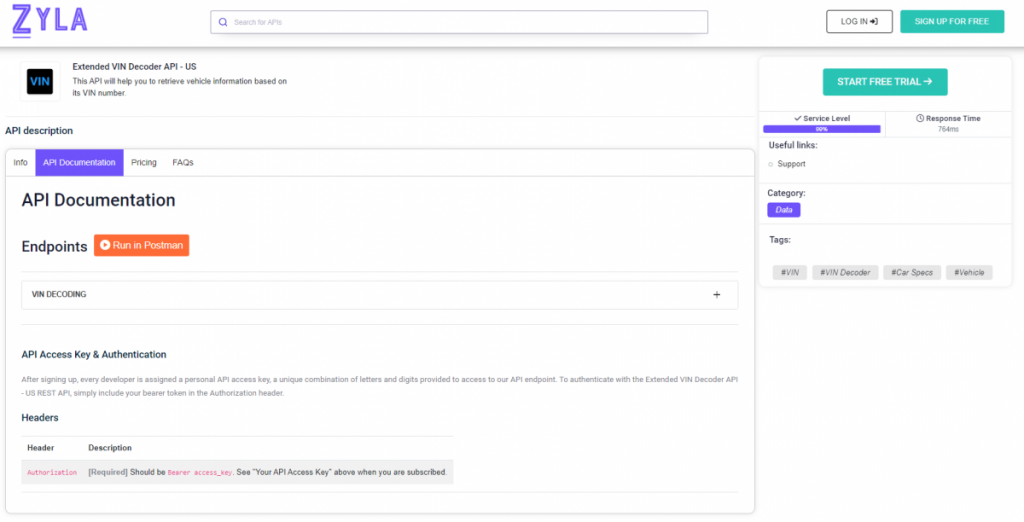Embarking on the journey to integrate Vehicle Information API is akin to unleashing the horsepower of intelligent data within the automotive realm. This guide unveils the essentials of these APIs, providing insights into their core functionalities and showcasing how they serve as the driving force behind the development of high-performance applications.

Accelerating Understanding: What Defines Vehicle Information VIN APIs?
At the heart of this guide lies the essential question: What defines Vehicle Information VIN APIs? These APIs act as digital translators, specializing in decoding the alphanumeric puzzle encapsulated within a vehicle’s identification number (VIN). The VIN, unique to each vehicle, holds a wealth of information, and these APIs serve as the ignition key to unlock and harness this data.
The functionalities of Vehicle Information VIN APIs form the bedrock of their appeal. Firstly, these APIs decode the VIN, revealing essential details about the vehicle, including its make, model, manufacturing year, and country of origin. This foundational information becomes the fuel for applications, powering them with accurate and comprehensive data.
Secondly, the versatility of Vehicle Information VIN APIs extends beyond decoding basic information. They may provide insights into more intricate details such as engine specifications, transmission type, and historical data like recalls or service records. This depth of information amplifies the capabilities of applications, from streamlining inventory management in automotive retail to enhancing risk assessment in the insurance industry.
Fueling Applications: Where Vehicle Information VIN APIs Make A Difference
As we explore functionalities, it’s crucial to understand the practical applications of Vehicle Information VIN APIs. Firstly, in automotive retail, these APIs turbocharge the process for dealerships and online platforms by automating the retrieval of accurate and detailed information about vehicles in their inventory. This not only accelerates the sales process but also ensures consistency and precision in data presentation.
Moreover, in the domain of pre-purchase inspections, buyers and inspectors leverage Vehicle Information VIN APIs to swiftly verify the authenticity of VINs and access crucial details about a vehicle’s history. This not only simplifies decision-making but also reduces the need for extensive physical inspections, saving time and resources.
Insurance companies also experience a performance boost through the integration of Vehicle Information VIN APIs in risk assessment processes. The detailed information decoded from the VIN aids insurers in determining accurate premiums and coverage, contributing to more informed underwriting decisions and an optimized insurance workflow.
Navigating Integration: Strategies For Seamless Implementation
To harness the full potential of Vehicle Information VIN APIs, businesses must navigate the integration process strategically. Firstly, a clear understanding of the specific objectives, whether enhancing customer experiences or streamlining operational processes, guides the selection and integration of the most relevant APIs.
Security considerations are paramount in this journey. Dealing with sensitive vehicle information, Vehicle Information VIN APIs necessitate robust encryption measures to safeguard data. Adhering to data protection regulations ensures not only compliance but also fosters trust among end-users, an essential element in the success of integrated systems.
Lastly, staying informed about updates and advancements in the field is vital. The automotive landscape is dynamic, and regular assessments and updates guarantee the relevance and longevity of integrated systems, keeping applications finely tuned and ready for the road ahead.
Turbocharging Into The Future: The Role Of Vehicle Information VIN APIs in App Development
In conclusion, the integration of Vehicle Information VIN APIs is a strategic investment in the development of high-performance applications within the automotive industry. As businesses and developers leverage the essentials of these APIs, they rev up their apps, unlocking a future where data is not just decoded but utilized to propel applications to new heights of efficiency, accuracy, and user satisfaction. This guide stands as a roadmap, guiding the journey towards applications that are not just functional but finely tuned engines of automotive intelligence.
Check Extended VIN Decoder API – US
In the ever-changing world of automobiles, businesses and individuals need access to accurate and comprehensive vehicle data to make informed decisions. The Extended VIN Decoder API – US provides a powerful solution for this need, offering a wealth of information on over 300 million vehicles, dating back to 1981.

Here are some of the key benefits of adopting the Extended VIN Decoder API – US:
- Comprehensive Coverage: The API provides data on a wide range of vehicle information, including make, model, year, engine size, transmission type, fuel type, equipment and features, safety recalls, maintenance history, and manufacturing details. This comprehensive coverage allows businesses and individuals to gain a deep understanding of any vehicle, regardless of its age or make.
- Unparalleled Accuracy: The API leverages a sophisticated algorithm to provide highly reliable VIN decoding results. This accuracy is essential for businesses and individuals who need to rely on vehicle data for critical decisions.
- Effortless Integration: The API is a RESTful API that seamlessly integrates with any programming language or platform. This makes it easy for businesses and individuals to incorporate vehicle data into their existing systems and workflows.
- Scalable Performance: The API can handle high-volume requests with ease, catering to businesses of any size. This ensures that businesses and individuals can always access the vehicle data they need, even during peak times.
- Continuous Updates: The API is regularly updated with the latest vehicle data, ensuring that businesses and individuals always have access to the most up-to-date information.
All You Need To Do To Make Use Of It Is:
- First, go to Extended VIN Decoder API – US and click the “START FREE TRIAL” button.
- You will be able to access the API once you have registered with the Zyla API Hub.
- Use the API endpoint “VIN DECODING”.
- Click the “test endpoint” button to make an API call and examine the results on your screen.
For example, if you add a VIN number like 479, it will provide you with a response similar to this:
{
"brandName": "NISSAN",
"modelName": "Maxima",
"regionName": null,
"condition": null,
"msg": null,
"cacheTimeLimit": 120,
"data": {
"AirBagLocFront": "1st Row (Driver and Passenger)",
"BodyClass": "Sedan/Saloon",
"DisplacementCC": "3000",
"DisplacementCI": "183.0712322841",
"DisplacementL": "3",
"Doors": "4",
"EngineConfiguration": "V-Shaped",
"EngineCylinders": "6",
"EngineManufacturer": "Nissan",
"EngineModel": "VQ30",
"FuelTypePrimary": "Gasoline",
"Make": "NISSAN",
"MakeID": "478",
"Manufacturer": "NISSAN MOTOR COMPANY, LTD",
"ManufacturerId": "996",
"Model": "Maxima",
"ModelID": "2302",
"ModelYear": "1999",
"OtherRestraintSystemInfo": "3-Point manual belts",
"PlantCity": "YOKOSUKA CITY",
"PlantCompanyName": "Oppama Plant",
"PlantCountry": "JAPAN",
"PlantState": "KANAGAWA",
"SeatBeltsAll": "Manual",
"VIN": "JN1CA21DXXT805880",
"VehicleDescriptor": "JN1CA21D*XT",
"VehicleType": "PASSENGER CAR",
"RecallInfo": []
}
}
Finding APIs is straightforward thanks to Zyla Labs, a marketplace with top-notch service. Among the more than 1200 APIs that are available, you can narrow your search by using a category, word, or programming language. Each API is fully described in the marketplace, including the price, accompanying files, and terms of service.
Want to learn more? Read Fueling Progress: A Vehicle Information API Unleashed

